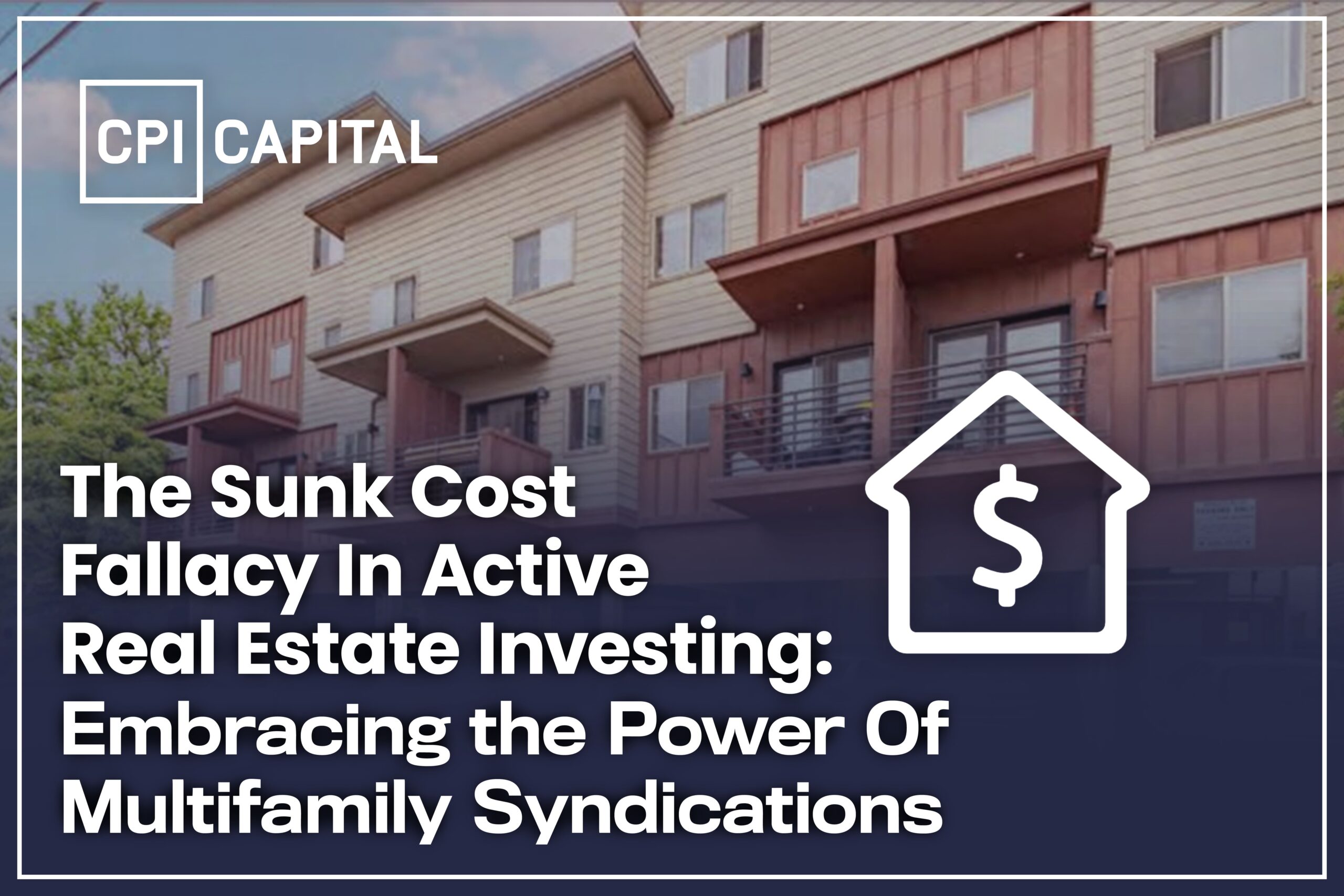
Dear valued existing investors and future investors,
Welcome to this week’s CPI Capital’s news briefing. Our regular, weekly newsletter contains a mixture of updates, commentary and informative related articles about the lucrative world of passive real estate investment.
If you are already one of our subscribers, thank you. If not, you can sign up to our newsletter now and keep right up to date with all you need to know about syndicated real estate investment!
SIGN UP HERE to receive our investment offerings
In this week’s newsletter, we will take a closer look at an important concept that affects many investors, whether they are active investors in multifamily real estate or have made some other form of investment : the so-called “Sunk Cost Fallacy”.
What is the Sunk Cost Fallacy?
The Sunk Cost Fallacy is a cognitive bias that leads individuals to continue investing a variety of resources (time, money, effort) into a real estate project or other venture solely because they have already invested so much into it. This is regardless of the diminishing investment returns or the potential of future losses.
In the context of real estate, the Sunk Cost Fallacy occurs when investors hold on to underperforming properties out of fear of losing their initial investment, even when it’s evident that they may be better off cutting their losses and letting go.
A key dilemma for real estate investors
For many professionals not engaged in real estate full time, active real estate investing can seem like an enticing, rewarding venture. The prospect of building wealth through property ownership and rental income can be alluring. However, the reality of active real estate investing often unfolds differently, especially for those with demanding careers and limited
time to apply to such investments.
An example would be where a successful lawyer, doctor or business executive decides to invest actively in multifamily or other real estate. They purchase several properties, hoping for stable passive income. However, they soon realise that managing real estate properties can be incredibly time-consuming and challenging.
This may be due to tenant issues or property maintenance or to legal matters, all of which take time to deal with. Finally, the demands of attending to such investments can become overwhelming, causing undue stress and disrupting their professional lives.
The Sunk Cost “trap”
Here’s where the Sunk Cost Fallacy creeps in. Having invested substantial time,
effort and money into the properties, some busy professionals may find themselves
unwilling to let go, even if the investment returns are meagre and the management of the properties has become a constant burden.
Every time they may consider selling the property asset to alleviate the problems, the overriding thought process is along the lines of, “Well I’ve come this far; I can’t quit now,” or “I need to sort this out and recoup my investment.”
Unfortunately, hanging on to such properties can be detrimental to such investors in the long term, leading to lost opportunities in other real estate assets or businesses, time wastage and, importantly, increasing stress levels. This is where recognising the bias of the Sunk Cost Fallacy at the right time becomes vital.
A far better option: multifamily real estate syndications
For active investors overwhelmed by the complexities of or problems associated with property management, a compelling alternative is available: Multifamily Syndications.
As regular readers of our newsletters know, multifamily real estate syndication is
a real estate investment strategy where multiple investors pool their resources to
purchase and operate large apartment complexes or multifamily properties or single family residences, leaving the management and the associated headaches with real estate professionals.
Just some of the benefits of multifamily real estate syndications
- Passive investing: as limited partners (LP) in the syndication, busy professionals can invest passively and enjoy the benefits of real estate ownership without being actively involved in property management. The responsibility of day-to-day operations and decision-making lies with experienced syndicators;
- Diversification: investing in multifamily syndications allows professionals to diversify their real estate portfolio across various properties and markets, reducing risks and enhancing the potential for higher returns;
- Scale and efficiency: multifamily properties offer economies of scale, enabling investors to leverage professional property management, access bulk pricing on services and reduce expenses, resulting in improved profitability;
- Professional expertise: syndications are typically managed by experienced real estate professionals who possess the necessary skills and knowledge to navigate the complexities of the market effectively;
- Time freedom: passive investing in multifamily syndications affords busy
professionals the luxury of time to focus on their careers, family or other interests, without sacrificing their financial goals.
Download and read our FREE e-book: 25 Fundamental questions to ask a Syndication Sponsor before making your investment
CPI Capital is well aware that the Sunk Cost Fallacy can ensnare active real estate investors who find themselves trapped in managing properties that don’t align with their investment goals.
Recognising this potential cognitive bias is an important component of making sound investment decisions although, with CPI Capital’s lengthy experience in multifamily real estate and validated investment decision making abilities, it is not a concept which often arises in our passive investments!
Yours sincerely,
August Biniaz
CIO, Co-Founder CPI Capital

Ready to build true wealth for your family?
It all starts with passive income. Apply to join the CPI Capital Investor Club.
Search
Recommended